

Defining openness: updating the concept of “open” for a connected world. Open education research: from the practical to the theoretical. By Patrick McAndrew and Robert Farrow Abstract Open Educational Resources (OER) remove restrictions for learners and educators by their nature.
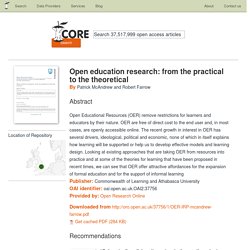
OER are free of direct cost to the end user and, in most cases, are openly accessible online. The recent growth in interest in OER has several drivers, ideological, political and economic, none of which in itself explains how learning will be supported or help us to develop effective models and learning design. Looking at existing approaches that are taking OER from resources into practice and at some of the theories for learning that have been proposed in recent times, we can see that OER offer attractive affordances for the expansion of formal education and for the support of informal learning.
Open education: A study in disruption. By P. van Mourik Broekman, G.
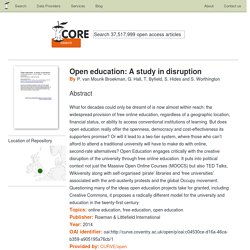
OpenCases: Case Studies on Openness in Education. By SOUTO-OTERO Manuel, INAMORATO DOS SANTOS ANDREIA, SHIELDS Robin, LAZETIC Predrag, CASTAÑO MUÑOZ JONATAN, DEVAUX Axelle, OBERHEIDT Stephanie and PUNIE Yves Abstract OpenCases is a study which is part of the OpenEdu Project.
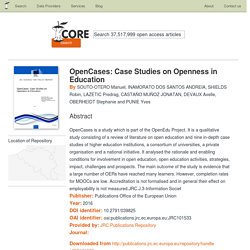
How are Higher Education Institutions Dealing with Openness? A Survey of Practices, Beliefs, and Strategies in Five European Countries. The impact of openness on bridging educational digital divides. By Andy Lane Abstract Openness has been a feature of higher education for many decades, particularly through the establishment of Open Universities, although there remain debates about what openness means in practice.
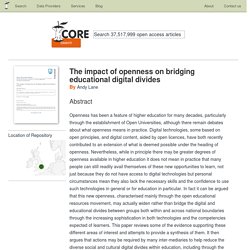
Digital technologies, some based on open principles, and digital content, aided by open licences, have both recently contributed to an extension of what is deemed possible under the heading of openness. Nevertheless, while in principle there may be greater degrees of openness available in higher education it does not mean in practice that many people can still readily avail themselves of these new opportunities to learn, not just because they do not have access to digital technologies but personal circumstances mean they also lack the necessary skills and the confidence to use such technologies in general or for education in particular. OAI identifier: oai:open.ac.uk.OAI2:24791 Recommendations. Widening participation in higher education through open educational resources. By Andy Lane Abstract This chapter examines the role that open educational resources might play in widening participation in higher education.
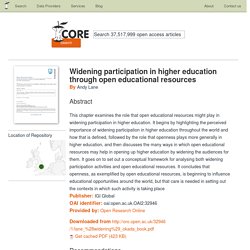
It begins by highlighting the perceived importance of widening participation in higher education throughout the world and how that is defined, followed by the role that openness plays more generally in higher education, and then discusses the many ways in which open educational resources may help in opening up higher education by widening the audiences for them. It goes on to set out a conceptual framework for analysing both widening participation activities and open educational resources. It concludes that openness, as exemplified by open educational resources, is beginning to influence educational opportunities around the world, but that care is needed in setting out the contexts in which such activity is taking place Publisher: IGI Global.
Best Practice Report on Widening Participation in Higher Education Study through Open Educational Resources. By Andrew Lane Abstract This document provides an overview of the literature and includes the full set of case studies provided by partners describing how OER can or might influence participation in higher education in different states across Europe.
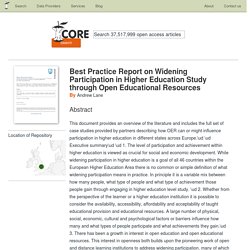
\ud \ud Executive summary\ud \ud 1. The level of participation and achievement within higher education is viewed as crucial for social and economic development. While widening participation in higher education is a goal of all 46 countries within the European Higher Education Area there is no common or simple definition of what widening participation means in practice. Publisher: European Association of Distance Teaching Universities. Inclusion in, and exclusion from, open education communities. Lane, Andrew; Comas-Quinn, Anna and Thomson, Simon (2014).
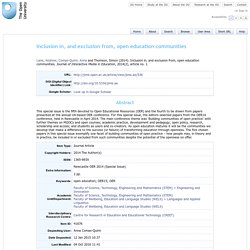
Journal of Interactive Media in Education, 2014(2), article no. 1. Abstract This special issue is the fifth devoted to Open Educational Resources (OER) and the fourth to be drawn from papers presented at the annual UK-based OER conference. For this special issue, the editors selected papers from the OER14 conference, held in Newcastle in April 2014. Collaborating across borders: OER use and open educational practices within the Virtual University for Small States of the Commonwealth. Perryman, Leigh-Anne and Lesperance, John (2015).
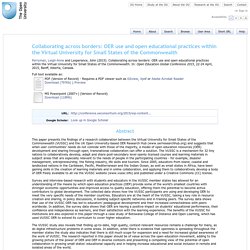
In: Open Education Global Conference 2015, 22-24 April, 2015, Banff, Alberta, Canada. Full text available as: Abstract This paper presents the findings of a research collaboration between the Virtual University for Small States of the Commonwealth (VUSSC) and the UK Open University-based OER Research Hub (www.oerresearchhub.org) and suggests that when user communities’ needs do not coincide with those of the majority, a model of open education resources (OER) development and sharing through open, transnational collaboration can offer a solution. The VUSSC is a mechanism for 32 tiny nations to collaboratively develop, adapt and share post-secondary level openly licensed courses and learning materials in subject areas that are especially relevant to the needs of people in the participating countries - for example, disaster management, entrepreneurship, the fishing industry, life skills and tourism.
Download history for this item. Women’s empowerment through openness: OER, OEP and the Sustainable Development GoalsCORE. By Leigh-Anne Perryman and Beatriz de los Arcos Abstract This paper explores the potential of open educational resources (OER) and open educational practices (OEP) in helping achieve women’s empowerment in the developing world.
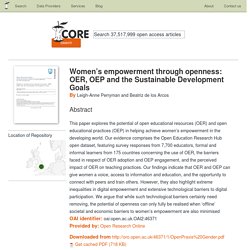
Our evidence comprises the Open Education Research Hub open dataset, featuring survey responses from 7,700 educators, formal and informal learners from 175 countries concerning the use of OER, the barriers faced in respect of OER adoption and OEP engagement, and the perceived impact of OER on teaching practices. Our findings indicate that OER and OEP can give women a voice, access to information and education, and the opportunity to connect with peers and train others. However, they also highlight extreme inequalities in digital empowerment and extensive technological barriers to digital participation. OAI identifier: oai:open.ac.uk.OAI2:46371 Recommendations. Learning the Lessons of Openness. By Patrick McAndrew, Robert Farrow, Patrina Law and Gary Elliott-Cirigottis Abstract The Open Educational Resources (OER) movement has built up a record of experience and achievements since it was formed 10 years ago as an identifiable approach to sharing online learning materials.
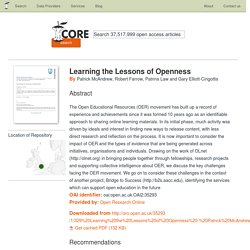
In its initial phase, much activity was driven by ideals and interest in finding new ways to release content, with less direct research and reflection on the process. It is now important to consider the impact of OER and the types of evidence that are being generated across initiatives, organisations and individuals. Drawing on the work of OLnet ( in bringing people together through fellowships, research projects and supporting collective intelligence about OER, we discuss the key challenges facing the OER movement. OAI identifier: oai:open.ac.uk.OAI2:35293 Recommendations If you think this content is not provided as Open Access according to the BOAI definition then please contact us immediately. Supporting lifelong learning with Open Educational Resources (OER) among diverse users: motivations for and approaches to learning with different OER.
By Katarzyna Aldona Kozinska Abstract This thesis presents a study which aimed to understand: 1) What motivates and influences learning with Open Educational Resources (OER) among different users, and 2) What role OER play in supporting lifelong learning among different users. The activities of key international organisations promoting lifelong learning as significant in the context of globalisation, combined with the innovative character of OER as high-quality open learning resources, were the reasons for the focus. \ud \ud The aim was to understand the function of OER through exploring motivational aspects, approaches to and contexts of individual learning among users of five different OER: penLearn, OpenSpires, OpenStudy, METU OpenCourseWare and Wolne Lektury.
A case study approach allowed the focus on the uniqueness of specific OER. OAI identifier: oai:open.ac.uk.OAI2:40290 Recommendations Loading suggested articles... Reflecting on Open Educational Practices in Scotland. By Ronald Macintyre. Beyond the ivory tower: a model for nurturing informal learning and development communities through open educational practices. By Tony Coughlan and Leigh-Anne Perryman Abstract Open Educational Resources (OER) and Open Educational Practices (OEP) are making an evergrowing impact on the field of adult learning, offering free high-quality education to increasing numbers of people.
However, the top-down distribution of weighty university courses that typifies current provision is not necessarily suitable for contexts such as Continued Professional Development (CPD). This article proposes that a change of focus from a supplier-driven to a needs-led approach, grounded in theories of informal learning, could increase the positive impact of OER and OEP beyond the ivory towers of higher education. \ud \ud To explore this approach, we focused on the requirements of a specific community outside higher education – trainers in the UK’s voluntary sector – in order to design a more broadly applicable model for a sustainable online learning community focused around OER and OEP.
OAI identifier: oai:open.ac.uk.OAI2:36361. Open Educational Practices and Attitudes to Openness across India: Reporting the Findings of the Open Education Research Hub Pan-India Survey. An Uneasy Relationship: Open Educational Practice and Neoliberalism. By Ronald Macintyre. Open Education and the Hidden Tariff.